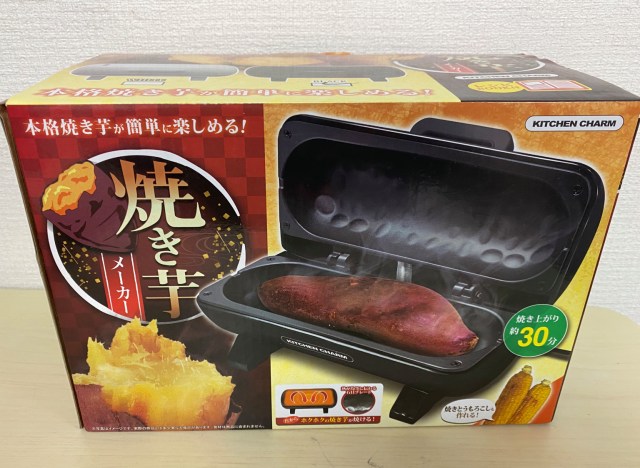
Enjoy the seasonal flavour of a stone-roasted yakiimo from the comfort of your kitchen!
One of the best comfort foods you can enjoy in Japan during autumn and winter is a steaming hot, roasted sweet potato. Known as yakiimo, this tasty treat is so popular during the colder months that vendors drive around neighbourhoods in small trucks selling them with an echoing, melodic “Yaaaaa-kiiii-mo“, and there are even vending machines dedicated to them so people can purchase them at any time of the day or night.
▼ A yakiimo (やきいも) vendor
Often grilled over hot stones, nothing beats the smoky, sweet, richness of a good yakiimo, but the only problem is the stone-roasted flavour can be hard to replicate at home without professional equipment. So when our Japanese-language reporter Kamezawa Ikuna came across a yakiimo maker at an electronics store in Akihabara, she immediately picked it up and took it back to the office to try it out.
According to the instructions, the sweet potato should first be washed with water, wrapped in plastic wrap, and then heated in the microwave for one minute. The hardness of the potato doesn’t appear to change after only a minute in the microwave, but it does help to start the heating process inside the vegetable.
The potato can then be unwrapped and placed into the maker, which kind of makes it look like the vegetable is about to get a tan inside a tanning bed. Potatoes need to be no wider than 6.5 centimetres (2.5 inches) across and 21 centimetres long to fit into the machine.
The recommended cooking time is 30 minutes, so Ikuna covered the naked potato with the lid and set her alarm. After just a few minutes, the machine started emitting strange noises, but after a quick check, she realised these were the crackling sounds of the potato being roasted — the same sounds you’d hear from a professional yakiimo vendor’s roasting machine.
It didn’t take long before the tantalising smell of baked sweet potato began to fill the air, making everyone’s stomachs rumble in the office. At the 30-minute mark, Ikuna lifted the lid on her sweet potato and pressed a toothpick into its centre to check if it was cooked.
It was soft and ready to eat, but Ikuna wanted to get some dark, roasted patches on the skin, just like the ones you see on yakiimo sold at stores and neighbourhood trucks. So she left it in for a further 20 minutes, until it looked like this.
At this point, the juices from the sweet flesh had begun to seep out from the place where she’d pricked it with a toothpick, oozing out like honey as the sugars crystallised on the skin. In Ikuna’s opinion, this a sign of a perfectly cooked yakiimo, and when she pulled it apart, she was so surprised she let out a gasp. The texture, appearance and aroma was identical to a stone-grilled yakiimo!
So how did it taste? Ikuna took a bite and her eyes opened wide as she tasted the hearty, warm, familiar flavours of an excellent stone-roasted yakiimo. It was absolutely delicious!
As someone who’s tried to bake a good yakiimo at home multiple times with no success, Ikuna couldn’t believe she’d finally made the perfect sweet potato, thanks to this little machine. She was so impressed she decided to share the other half of the potato with her colleague Takashi to get his opinion.
▼ “Oh. My. God. This tastes as good as the roasted potatoes you get at a shop!!!”
Even Takashi was blown away by the taste of the sweet potato she’d made at her office desk, but Ikuna had another trick up her sleeve, because…this sweet potato maker can also roast corn!
Just prepare the corn in the same way as the potato — by wrapping it in clear wrap and microwaving it for one minute — and then pop it in the maker. Sprinkling it with a little soy sauce will add some delicious colour and flavour to the corn.
This was another winner, as the roasted flavour of the corn tasted infinitely better than ordinary boiled, steamed or microwaved ones.
The yakiimo maker cost just 1,500 yen, making it great value for money, considering electric roasters like this can retail upwards of 3,000 yen. This particular roaster isn’t that easy to find but it is available to purchase from Rakuten for 1,700 yen.
Ikuna highly recommends buying one if you can, as a roasted potato on a cold day really is one of Japan’s simple pleasures. And if you want to make a more sumptuous meal, there’s always this one-person rice cooker…which you can also use at your office desk to make all your colleagues green with envy.
Photos ©SoraNews24
● Want to hear about SoraNews24’s latest articles as soon as they’re published? Follow us on Facebook and Twitter!
[ Read in Japanese ]

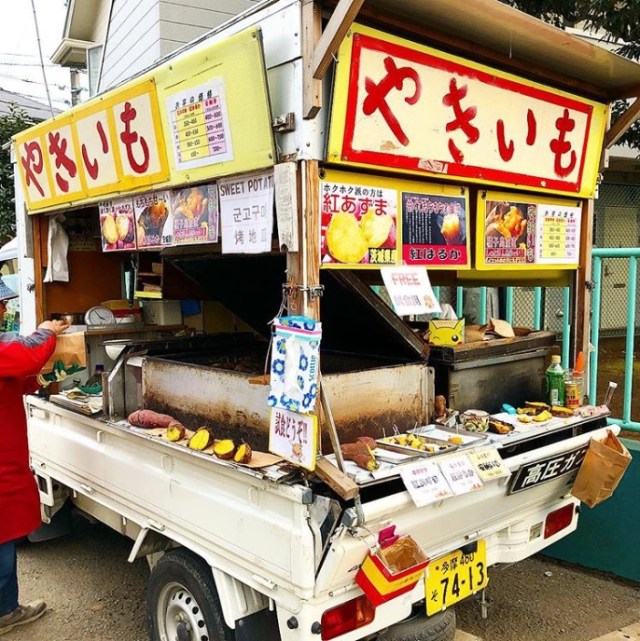

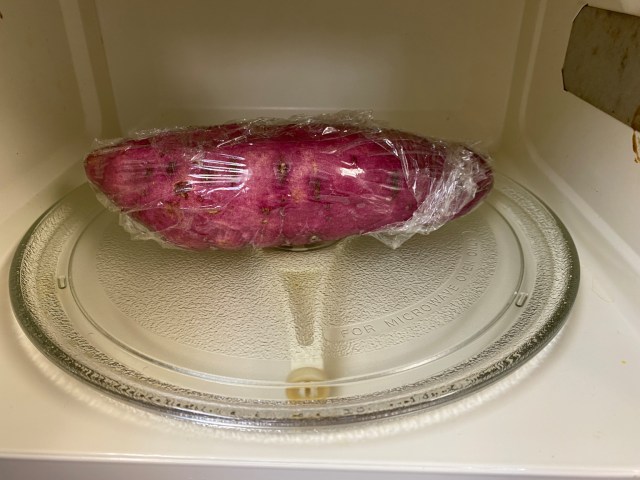
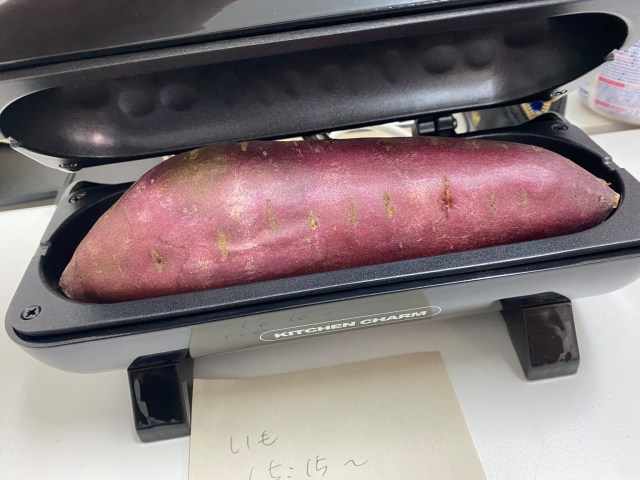


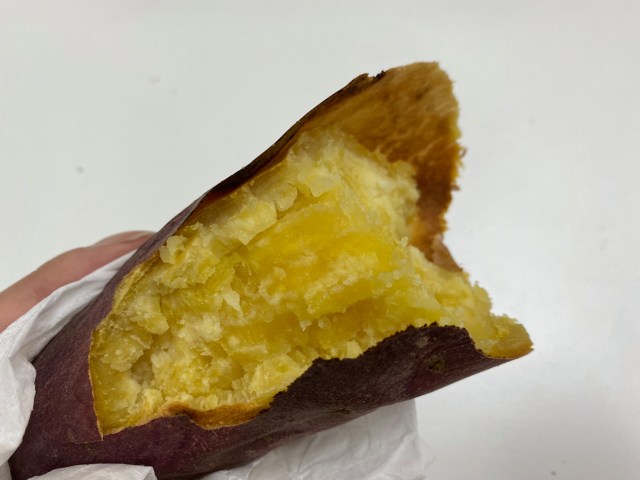
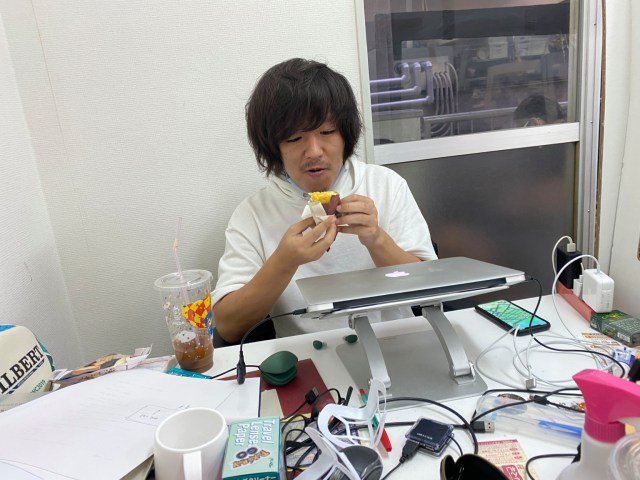
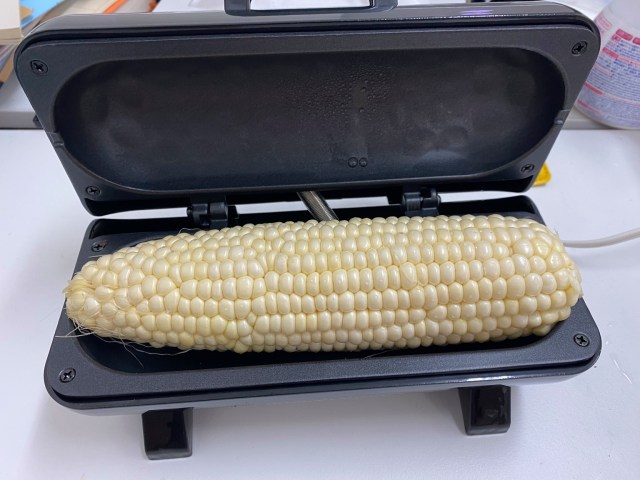
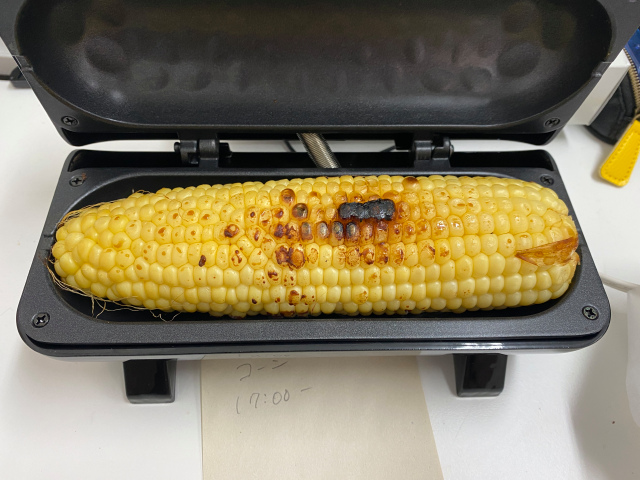
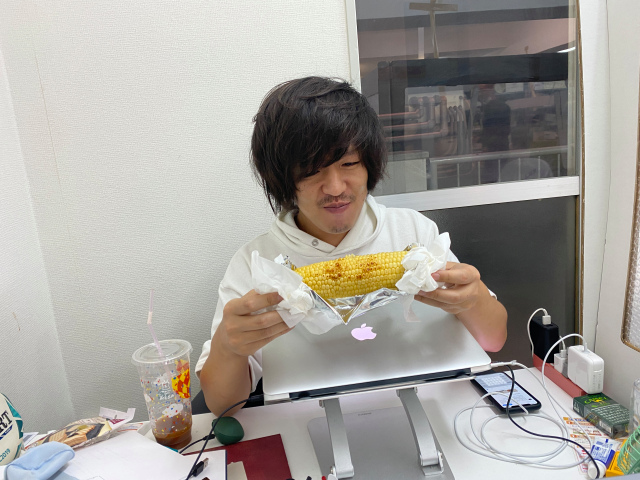
 Hey! You Can Drink Sweet Potatoes, says Japanese beverage maker with new drink
Hey! You Can Drink Sweet Potatoes, says Japanese beverage maker with new drink Japan now has drinkable roasted sweet potato, and it’s practically a dessert in a bottle!
Japan now has drinkable roasted sweet potato, and it’s practically a dessert in a bottle! Sweet potato sweets season arrives at convenience store Family Mart, so let’s go taste-test-crazy
Sweet potato sweets season arrives at convenience store Family Mart, so let’s go taste-test-crazy Tokyo cafe serves up the artsiest version of a drinkable roasted sweet potato that we’ve seen yet
Tokyo cafe serves up the artsiest version of a drinkable roasted sweet potato that we’ve seen yet Weird Japanese vending machine find gives us unique sweet potato sweets
Weird Japanese vending machine find gives us unique sweet potato sweets Japanese city loses residents’ personal data, which was on paper being transported on a windy day
Japanese city loses residents’ personal data, which was on paper being transported on a windy day Foreigner’s request for help in Tokyo makes us sad for the state of society
Foreigner’s request for help in Tokyo makes us sad for the state of society Should you add tartar sauce to Japanese curry rice? CoCo Ichi makes diners an unusual offer
Should you add tartar sauce to Japanese curry rice? CoCo Ichi makes diners an unusual offer Ghibli Park now selling “Grilled Frogs” from food cart in Valley of Witches
Ghibli Park now selling “Grilled Frogs” from food cart in Valley of Witches Seaside scenery, history, and so many desserts on Yokohama’s Akai Kutsu【Japan Loop Buses】
Seaside scenery, history, and so many desserts on Yokohama’s Akai Kutsu【Japan Loop Buses】 Historical figures get manga makeovers from artists of Spy x Family, My Hero Academia and more
Historical figures get manga makeovers from artists of Spy x Family, My Hero Academia and more Mt. Koya planning to instate visitor’s tax to cope with huge tourist numbers
Mt. Koya planning to instate visitor’s tax to cope with huge tourist numbers Beautiful Ghibli sealing wax kits let you create accessories and elegant letter decorations【Pics】
Beautiful Ghibli sealing wax kits let you create accessories and elegant letter decorations【Pics】 Suntory x Super Mario collaboration creates a clever way to transform into Mario【Videos】
Suntory x Super Mario collaboration creates a clever way to transform into Mario【Videos】 Shinjuku izakaya’s all-you-can-eat-and-drink plan is one of Tokyo’s best secret cheap eats
Shinjuku izakaya’s all-you-can-eat-and-drink plan is one of Tokyo’s best secret cheap eats McDonald’s new Happy Meals offer up cute and practical Sanrio lifestyle goods
McDonald’s new Happy Meals offer up cute and practical Sanrio lifestyle goods Japanese ramen restaurants under pressure from new yen banknotes
Japanese ramen restaurants under pressure from new yen banknotes French Fries Bread in Tokyo’s Shibuya becomes a hit on social media
French Fries Bread in Tokyo’s Shibuya becomes a hit on social media Studio Ghibli releases new action figures featuring Nausicaä of the Valley of the Wind characters
Studio Ghibli releases new action figures featuring Nausicaä of the Valley of the Wind characters New private rooms on Tokaido Shinkansen change the way we travel from Tokyo to Kyoto
New private rooms on Tokaido Shinkansen change the way we travel from Tokyo to Kyoto Red light district sushi restaurant in Tokyo shows us just how wrong we were about it
Red light district sushi restaurant in Tokyo shows us just how wrong we were about it Tokyo Tsukiji fish market site to be redeveloped with 50,000-seat stadium, hotel, shopping center
Tokyo Tsukiji fish market site to be redeveloped with 50,000-seat stadium, hotel, shopping center All-you-can-drink Starbucks and amazing views part of Tokyo’s new 170 meter-high sky lounge
All-you-can-drink Starbucks and amazing views part of Tokyo’s new 170 meter-high sky lounge Studio Ghibli releases Kiki’s Delivery Service chocolate cake pouches in Japan
Studio Ghibli releases Kiki’s Delivery Service chocolate cake pouches in Japan New definition of “Japanese whiskey” goes into effect to prevent fakes from fooling overseas buyers
New definition of “Japanese whiskey” goes into effect to prevent fakes from fooling overseas buyers Our Japanese reporter visits Costco in the U.S., finds super American and very Japanese things
Our Japanese reporter visits Costco in the U.S., finds super American and very Japanese things Studio Ghibli unveils Mother’s Day gift set that captures the love in My Neighbour Totoro
Studio Ghibli unveils Mother’s Day gift set that captures the love in My Neighbour Totoro More foreign tourists than ever before in history visited Japan last month
More foreign tourists than ever before in history visited Japan last month New Pokémon cakes let you eat your way through Pikachu and all the Eevee evolutions
New Pokémon cakes let you eat your way through Pikachu and all the Eevee evolutions Sales of Japan’s most convenient train ticket/shopping payment cards suspended indefinitely
Sales of Japan’s most convenient train ticket/shopping payment cards suspended indefinitely Sold-out Studio Ghibli desktop humidifiers are back so Totoro can help you through the dry season
Sold-out Studio Ghibli desktop humidifiers are back so Totoro can help you through the dry season Japanese government to make first change to romanization spelling rules since the 1950s
Japanese government to make first change to romanization spelling rules since the 1950s Ghibli founders Toshio Suzuki and Hayao Miyazaki contribute to Japanese whisky Totoro label design
Ghibli founders Toshio Suzuki and Hayao Miyazaki contribute to Japanese whisky Totoro label design Doraemon found buried at sea as scene from 1993 anime becomes real life【Photos】
Doraemon found buried at sea as scene from 1993 anime becomes real life【Photos】 Tokyo’s most famous Starbucks is closed
Tokyo’s most famous Starbucks is closed One Piece characters’ nationalities revealed, but fans have mixed opinions
One Piece characters’ nationalities revealed, but fans have mixed opinions We asked a Uniqlo employee what four things we should buy and their suggestions didn’t disappoint
We asked a Uniqlo employee what four things we should buy and their suggestions didn’t disappoint Princesses, fruits, and blacksmiths: Study reveals the 30 most unusual family names in Japan
Princesses, fruits, and blacksmiths: Study reveals the 30 most unusual family names in Japan Japanese vending machine is the only one of its kind in Japan, dubbed the “phantom machine”
Japanese vending machine is the only one of its kind in Japan, dubbed the “phantom machine” McDonald’s breakfast menu in Hong Kong is like nothing we’ve ever seen in Japan
McDonald’s breakfast menu in Hong Kong is like nothing we’ve ever seen in Japan We make chocolate-covered potato chips
We make chocolate-covered potato chips What happens when you cook beer with potato chips in a rice cooker?
What happens when you cook beer with potato chips in a rice cooker? Japan’s big eats just got even bigger at this little-known cafe
Japan’s big eats just got even bigger at this little-known cafe We get our hands on a coveted Yodobashi lucky bag, this time the beauty and health gadget box
We get our hands on a coveted Yodobashi lucky bag, this time the beauty and health gadget box Ramen and girls bar: Where you can talk to women who aren’t dressed like hosts or maids
Ramen and girls bar: Where you can talk to women who aren’t dressed like hosts or maids Thanko’s lucky bag for 2023 brings the heat in more ways than one
Thanko’s lucky bag for 2023 brings the heat in more ways than one New “wet” potato chips revolutionise the snack industry in Japan
New “wet” potato chips revolutionise the snack industry in Japan We visit a restaurant called ‘Otaku’ in France, eat some otaku sushi
We visit a restaurant called ‘Otaku’ in France, eat some otaku sushi Japan has a special foil for roasting sweet potatoes at home, and it’s like having a time machine
Japan has a special foil for roasting sweet potatoes at home, and it’s like having a time machine Have you tried Tokushima ramen? No? You should (says our obsessed Japanese-language reporter)
Have you tried Tokushima ramen? No? You should (says our obsessed Japanese-language reporter) The best-selling rice ball at Family Mart is…SPAM onigiri?
The best-selling rice ball at Family Mart is…SPAM onigiri? “Hey Singaporean taxi driver! Take us to the best restaurant in Singapore!”
“Hey Singaporean taxi driver! Take us to the best restaurant in Singapore!” Three of the best Japanese convenience store sweets you’ll want to try this autumn
Three of the best Japanese convenience store sweets you’ll want to try this autumn
Leave a Reply